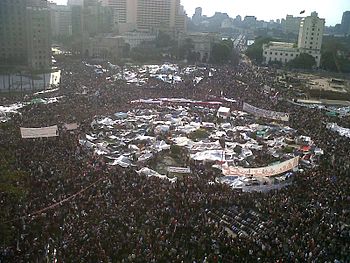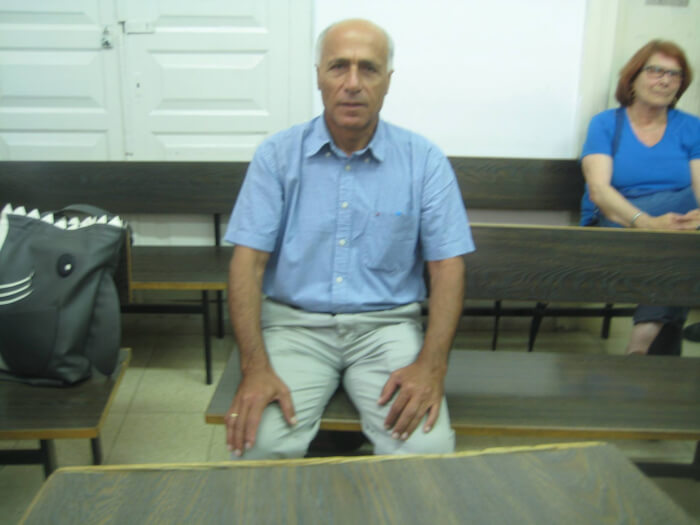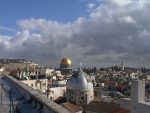Since the Arab Spring crashed into Cairo’s Tahrir Square in 2011, Egypt has been on a roller coaster. Once the cornerstone of secularism in a world of growing religious extremism, Egypt could use some excesses to protect itself from the Islamic extremists. But in recent years, Egypt has not been discretionary in how it deals with the religious threat and its human rights violations have become excessive and threaten to undermine its ability to defend Arab secularism
By Ray Hanania

Like many American Arabs, I’ve shared mixed feelings about the dramatic changes that have taken place during the past five years in Egypt.
The Arab Spring swept through Egypt in January 2011 and it was exciting. Protestors demanded freedoms, an end to censorship and they wanted Democracy so they could elect their own leadership.
Tahrir Square became the iconic image of the Arab Spring as it swept through the Arab World. After all, how could anyone oppose Democracy and the principle of “one-person, one vote” in which individuals, and not powerful tyrants, would decide the future of millions of people?
The first organized Egyptian group to stand up in support of the protestors was the Muslim Brotherhood, which represented a movement to impose the Islamic religion and laws on the country.
Within weeks, “moderate” tyrant Husni Mubarak resigned from office. The government was taken over by the military which declared it would serve only as caretakers until open elections could be held, which took place in June 2012.

Of course, the election resulted in the elections of the only organized group in Egypt, the Muslim Brotherhood. Ironically, the largest organization in Egypt is the Coptic Christian Church but Coptic Christians, while supportive of Democracy, Christians have tended to stay out of the mainstream.
Christian Arabs generally have found ways to “survive” under tyranny and dictators, and tyrants and dictators have tended to oppress “softly” with Christians because they are a minority and are a major connection to the Christian West.
So Coptic Christians tended to not directly engage or support the Arab Spring, fearing change would undermine their stability.
Naturally, then, the Muslim Brotherhood easily swept the elections. Mohammed Morsi, a MB leader, won the election with 51.7 percent of the vote. There was hope that Morsi would adhere to Democratic principles, but like the elections in Palestine where Hamas won some major victories, the Islamic political movement doesn’t truly embrace Democracy. Nor do they support crucial Democratic principles like “one-person, one vote.” They especially oppose the activism of women in secular politics.
Within months, Morsi gave himself powers that undermined the checks and balances of Democracy, and he pushed for an Islamic Constitution to replace both the Mubarak dictatorship and secular Democracy.
Naturally, Morsi was unseated in a power coup led by the military. But this time, instead of stepping aside to allow for the nurturing of home-grown Democracy, the Military basically actively backed one of their own, General Abdel Fatah al-Sisi who took control in July 2013.
Instead of non-violent protests, Muslim Brotherhood activists took to the streets with violence giving General Al-Sisi the basis to crack down on the “new” protestors, and eventually arresting thousands, sentencing 529 to death by March 2014. By the end of 2014, al-Sisi was elected president with a foreboding 96 percent of the electorate behind his candidacy, a subtle reminder of the same percentages that Mubarak received during his rump elections before the Arab Spring.

Rather than bringing stability to Egypt, however, al-Sisi’s policies have brought Egypt to the brink again. It’s almost as if he is trying to plunge the country into more conflict, and maybe that is so. Remember, dictators find their power not in true Democratic elections but in rising conflict when they impose new restrictions and slowly undermine Democracy.
The first mistake al-Sisi made was to paint himself as a stooge of the West. Although the Arab people want Democracy, they want true Democracy, not the phony Democracy that is practiced in West, such as in the United States where minorities are bullied, and American Arabs are harassed, excluded and marginalized.
Things continued to worsen as “President” Al-Sisi openly maintained relations with neighboring Israel, one of the most repressive “Democracies” in the world. No other so-called Democracy embraces apartheid-like policies against segments of its citizenship (Christians and Muslims) and maintains a more brutal occupation as it does in the West Bank and in East Jerusalem.
In Israel’s case, it’s first target was to censor Christians and Muslims by banning Palestinian nationalism, and by censoring and arresting Palestinian journalists.
General al-Sisi has been doing the same thing, arresting more than 22 journalists for reporting the facts of his failed Democratic reforms.
But like many Christian Arabs, the alternatives have never been good.
The problems started because the Muslim Brotherhood could not shake off its inherent nature as a religious movement first. Had President Morsi attempted to impose a truly Democratic government, he might still be in power.
But the religious extremists, even when they embrace Democracy, can never maintain that façade for long.
So the choice in Egypt is the same tragic choice that, so far, all Arabs have faced. Either they can surrender to the oppression of the religious extremists in the Muslim World, or they can turn to iron-fisted dictators to maintain controls without allowing freedoms and choice to the general public.
Sadly, Gen. al-Sisi’s oppressive rules are better than those sought by the Muslim Brotherhood, a tragic choice that unfortunately the Arab World cannot seem to escape.
Ray Hanania is an award-winning Palestinian American columnist managing editor of The Arab Daily News at www.TheArabDailyNews.com. Follow him on Twitter @RayHanania. To find out more about Ray Hanania and read features by other Creators Syndicate writers and cartoonists, visit www.creators.com. COPYRIGHT 2015 CREATORS.COM.


- Israelisnipers shooting and killing hospital workers in Gaza - December 11, 2023
- CAIR Condemns Israeli Executions of Wounded, Unarmed Palestinian in West Bank - December 11, 2023
- Arab and Muslim American voters face a “simple choice” between Biden’s inhumanity and Trump’s edgy politics - December 9, 2023























Who are u fooling? Everyone knows that democracy doesn’t exist in Muslim countries..Egypt is no special..why don’t u try to say that word in an absolute monarchy country like Saudi Kuwait or Jordan? U will be arrested for offending their king..
It’s no worse than the racism and oppression in this country which punishes ANYONE who dares to criticize Israel’s government, which has a headlock on our US Congress and the pathetic, biased and unprofessional news media. And of course, you don’t mention how White racists brutalize Muslims and Arabs and Black people and other minorities in America … the oppression in America is just a different form than the one in the Middle East and in Israel.